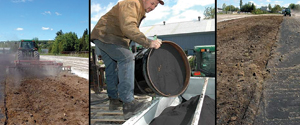Dynamotive, BlueLeaf release biochar test results




January 1, 1970
BY Anna Austin
Canadian companies, Dynamotive Energy Systems Corp., a Vancouver, British Columbia-based biomass-to-fuel company, and BlueLeaf Inc., a private, applied environmental research company, have released the results of a year-long test applying Dynamotive's CQuest Biochar in commercial farming test plots. The tests revealed an overall increase in crop yield from 6 percent to 17 percent in plots where biochar was applied versus the control plots
The field trial using Dynamotive's biochar, which is produced through fast pyrolysis of hardwood waste material, was performed as a preliminary evaluation of the use of biochar in commercial farming operations in Canada, as well as in relation to local climate and soil conditions. The test plots were located on a farm in eastern Quebec.
Objectives of the experiment included determining the influence of biochar on certain basic physicochemical and biological soil and plant parameters, the ability of biochar to retain certain nutrients and moisture in the soil, the influence of biochar on soil microbial communities and crop and biomass yields, the influence of biochar on greenhouse gas emissions from the soil, and to evaluate a method to handle and apply biochar to the soil.
According to the report, the biochar was packed at the Dynamotive production facility in 45-gallon (200-liter) steel drums, each containing approximately 121 pounds (55 kilograms) of product, and shipped by truck to the farm trial site. The product used in the trial was produced in 2007 and kept in storage by the producer until shipment to the trial site in 2008.
The targeted application rate for the biochar was 2.5 tons per acre. A significant concern during the spreading of this material was loss due to biochar's fine particle size, according to the report. Although some biochar was lost at various stages of handling, losses while it was being spread on the fields were the highest. Although wind velocity was low at the time of spreading, loss rates were visually estimated to be significant, totaling approximately 30 percent. Assuming this rate of loss, the actual application of biochar for this trial would be 1.75 tons per acre. "It appears therefore essential from this experience to find methods to reduce such losses," the report said.
Crop and plant yields were measured using three different methods, including plant density at harvest, individual plant analysis and yield at harvest using harvester machine calculations. In certain planting methods, plant density increased up to 41 percent. The overall average was a 24 percent plant density increase with biochar use.
Test results are available at http://dynamotive.com.c9.previewyoursite.com/wp-content/themes/dynamotive/pdf/BlueLeaf_Biochar_Field_Trial_2008.pdf.
In the U.S., Dynamotive is supporting several different research efforts including a study by the USDA Agricultural Research Service to quantify the effects of amending soils with CQuest Biochar on crop productivity, soil quality, carbon sequestration and water quality. Initial findings from that study are expected to be available later this year.
The company recently reported that it had secured a supply of 220,000 tons per year of sawdust from Southeast timber producer Springhill Land and Timber for a proposed bio-oil plant in southern Arkansas (for more information see "Dynamotive secures feedstock supply for planned bio-oil plant" at http://www.biomassmagazine.com/article.jsparticle_id=2642).
The field trial using Dynamotive's biochar, which is produced through fast pyrolysis of hardwood waste material, was performed as a preliminary evaluation of the use of biochar in commercial farming operations in Canada, as well as in relation to local climate and soil conditions. The test plots were located on a farm in eastern Quebec.
Objectives of the experiment included determining the influence of biochar on certain basic physicochemical and biological soil and plant parameters, the ability of biochar to retain certain nutrients and moisture in the soil, the influence of biochar on soil microbial communities and crop and biomass yields, the influence of biochar on greenhouse gas emissions from the soil, and to evaluate a method to handle and apply biochar to the soil.
According to the report, the biochar was packed at the Dynamotive production facility in 45-gallon (200-liter) steel drums, each containing approximately 121 pounds (55 kilograms) of product, and shipped by truck to the farm trial site. The product used in the trial was produced in 2007 and kept in storage by the producer until shipment to the trial site in 2008.
The targeted application rate for the biochar was 2.5 tons per acre. A significant concern during the spreading of this material was loss due to biochar's fine particle size, according to the report. Although some biochar was lost at various stages of handling, losses while it was being spread on the fields were the highest. Although wind velocity was low at the time of spreading, loss rates were visually estimated to be significant, totaling approximately 30 percent. Assuming this rate of loss, the actual application of biochar for this trial would be 1.75 tons per acre. "It appears therefore essential from this experience to find methods to reduce such losses," the report said.
Crop and plant yields were measured using three different methods, including plant density at harvest, individual plant analysis and yield at harvest using harvester machine calculations. In certain planting methods, plant density increased up to 41 percent. The overall average was a 24 percent plant density increase with biochar use.
Test results are available at http://dynamotive.com.c9.previewyoursite.com/wp-content/themes/dynamotive/pdf/BlueLeaf_Biochar_Field_Trial_2008.pdf.
In the U.S., Dynamotive is supporting several different research efforts including a study by the USDA Agricultural Research Service to quantify the effects of amending soils with CQuest Biochar on crop productivity, soil quality, carbon sequestration and water quality. Initial findings from that study are expected to be available later this year.
The company recently reported that it had secured a supply of 220,000 tons per year of sawdust from Southeast timber producer Springhill Land and Timber for a proposed bio-oil plant in southern Arkansas (for more information see "Dynamotive secures feedstock supply for planned bio-oil plant" at http://www.biomassmagazine.com/article.jsparticle_id=2642).
Advertisement
Advertisement
Advertisement
Advertisement
Upcoming Events





